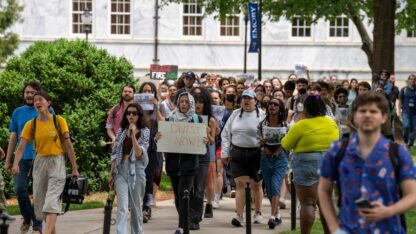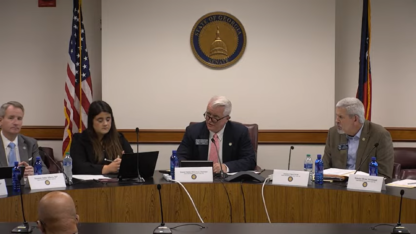Georgia’s 2020 Legislative Roundup: Hate Crimes Bill, Alcohol Delivery And More

People scurry up Capitol steps as others stand and talk during opening day of Georgia’s 2020 legislative session in January. This year’s session was marked with a three-month recess due to the coronavirus pandemic.
John Amis / Associated Press
Updated June 26, 11:33 p.m.
This year’s legislative session was unique in a number of ways. Lawmakers were forced to recess in March due to concerns from the coronavirus pandemic, and by the time the body reconvened for its 30th legislative day on June 15, the world—and Georgia—was a very different place.
Now that this session has come to a close, we’ll look at just what lawmakers were able to accomplish during a term that experienced unprecedented disruptions and demands.
Here are some of the bills that passed and some that didn’t make it through.
Passed:
Protection For Business From COVID-19 Liability – SB 359 – Under the language approved Friday, a business, health care provider or protected entity would have to display gross negligence, “willful and wanton misconduct” or reckless or intentional infliction of harm to lose a lawsuit. House members voted 104-56 to approve Senate Bill 359, and senators agreed to the changes on a 34-16 vote, sending the measure to Gov. Brian Kemp for his signature or veto.
State Budget – HB 793 – Georgia’s state budget includes 10% in cuts. That’s a nearly $2 billion reduction, a billion of which is being cut from K-12 and higher education. The drastic scale back in spending comes amid the recession caused by the COVID-19 pandemic. It was originally projected to be a 14% across-the-board cut but has since been reduced. The state was allowed to draw $250 billion in savings to help avoid other cuts. The Senate passed the budget Thursday night 40-13, and the House passed it on Friday night 104-62.
House Appropriations Chair Terry England presents budget “It’s tough to cut 10 percent. There’s nothing easy about cutting 10 percent out of the budget. I truly believe what you have on your desk in front of you is something you can go home and be proud of.” pic.twitter.com/l9fGTrA2Sk
— Emil Moffatt (@EmilMoffatt) June 27, 2020
Hate Crimes – HB 426 protects people from crimes intentionally committed because of certain identities, including race, gender, sexual orientation or disability, passed in the House last year but was stalled in a Senate committee. As the legislative session resumed earlier this month, lawmakers faced new pressure to pass a hate crimes bill when court proceedings revealed that Travis McMichael, one of the men accused in connection with the murder of Ahmaud Arbery in Brunswick, Georgia, may have used a racial slur after the shooting.
After some back and forth between lawmakers about whether to include first responders as part of the bill, HB 426 passed and was signed in to law by Gov. Kemp on Friday at 2 p.m.
“Following outrage over the shooting death of Ahmaud Arbery, Georgia is no longer one of a handful of states without a hate crimes law.” #gapol #AhmaudArbery https://t.co/UriFDiiK19
— Emma N. Hurt (@Emma_Hurt) June 26, 2020
Police Protections – HB 838 will create a new crime of bias-motivated intimidation for people who commit offenses against police, firefighters and emergency personnel. This bill is controversial because the language to protect first-responders was originally included in the HB 426 hate crimes bill but after strong pushback from Democrats and groups, including the ACLU of Georgia, senators transferred that language into a separate measure.
Extended Unemployed Benefits – SB 408 would allow Georgia to earn more money every week while still keeping their full unemployment benefits. The bill will also allow some in Georgia to collect benefits for longer than the previous 20-week limit.
Delivery of Alcohol – HB 879 allows alcohol to be delivered by grocery stores, restaurants and liquor stores. The state House gave final approval to legislation Thursday allowing packaged goods retailers to make home deliveries of beer, wine and liquor. House members approved of the bill 114-45.
PPE Manufacturers Tax Credit – HB 846 would give tax credits of $1,250 per job to makers of hand sanitizer, gloves, face shields, masks respirators and other personal protective equipment, whether they were making before or after the COVID-19 outbreak. It would also let businesses that claim one of the biggest tax credits in Georgia, for creating jobs that pay above-average wages, to use either their 2019 or 2020 job creation numbers to meet their contractual job-creation obligations to the state. Supporters say businesses need a break because COVID-19 may have interrupted hiring plans.
Standardized Tests – SB 367 would cut four of eight exams in high school and one exam in middle school. The Senate voted 45-0 to agree to the bill Thursday.
Lawmaker pay cut – SB 416 would cut lawmakers’ salary of more than $17,350 by 10% in the budget year beginning July 1, though they’d still get their full daily expense pay. Republican Lt. Gov. Geoff Duncan’s pay of nearly $92,000 a year would be cut by 14%, a cut he volunteered for.
The one-year pay cut is meant to show lawmakers are sharing the pain of the economic downturn brought on by the coronavirus pandemic. The state Senate voted 43-10 in favor of the legislation Thursday, after it passed the state House 106-51 on Wednesday.
Medical Coverage For New Moms – HB 1114 will provide an expansion of Medicaid coverage for new mothers. Currently, new mothers only receive coverage for two months after giving birth. Georgia has a high rate of mothers dying after birth, particularly concentrated among African American, rural and older mothers, according to a legislative study.
Vaping Tax – SB 375 would regulate and tax vaping products in the same way that tobacco products are taxed and regulated. House Republican leaders have declined to consider a push to increase taxes on tobacco products, despite a push by Democrats and anti-smoking advocates. The House voted 123-33 to pass Senate Bill 375, sending it back to the Senate for more debate. The bill passes the senate 45-8.
Medical Bills – House Bill 888 could help patients avoid fewer surprise medical bills. It would require insurers in many cases to pay for care by a doctor or at a hospital not within their network of providers. It also would limit patient liability for costs.
Criminal Records – SB 288 – People could ask a judge to restrict public access to criminal records of non-violent or non-sexual misdemeanors if they haven’t committed another offense within four years
Senior Homes – House Bill 987 would require higher training and safety requirements for assisted living and personal care home. It would increase fines for abuse and neglect.
Ride-Hailing Fees – HB 105 would impose a 50-cent-per-ride tax on ride-hailing services, taxis and limousines instead of leaving them to be subject to higher, regular sales tax.
Georgia Film Industry Audits – SB 1037 adds mandatory audits for companies that benefit from the state’s film tax credits. These have been some of the most lucrative tax credits in the nation. State leaders and many lawmakers argue that they have brought billions into the state from film and tv productions.
This bill gives a little more transparency into how those are used, to make sure companies are using these credits properly. There had been some calls for the state to put a cap on film tax credits others wanted to expand it, but neither of these ended up in the final bill. Passed both chambers.
Failed:
Primaries and Elections – SB 463 was amended to include a provision that would prohibit state or county election officials from sending out unsolicited absentee ballot applications. Secretary of State Brad Raffensberger sent absentee ballot applications to 6.9 million active voters in Georgia during the pandemic in an effort to encourage vote by mail and avoid heavy crowds at the polls on the day of the primary election.
Georgia voters responded in an unprecedented way, and 1.1 million absentee ballots were cast. But critics say this overwhelmed local officials and is one of the reasons for major delays at polling places on June 9 as some voters sought to cancel their absentee ballots. The House Government Affairs Committee also gutted the bill of its major legislation, which called on counties to either add equipment and personnel to precincts with long lines or add more polling places.
Sports Betting – Now added to HB 903 (formerly SB 403) – Originally tabled earlier this year, the Senate voted to revive Senate Bill 403 to allow wagers on sports in Georgia. The state’s lottery system would oversee sports betting. Within the last 10 days, the legislation was added to HB 903 Atlanta Hawks, Braves, Falcons, and Atlanta United FC executives all back the legislation. Advocates say the new industry could provide billions in much-needed revenue for Georgia. HB 903 is one of several pieces of legislation related to sports gambling.
Paid Parental Leave – HB 1094 originally gave three weeks of paid parental leave to state employees, but at the last minute, that language was replaced with a bill to cut all state lawmakers’ pay by 10%. There is still a chance paid parental leave could make it in as lawmakers have final negotiations.
Hazing – SB 423 would have raised criminal penalties for members of fraternities, sororities and any other college student groups that engage in hazing. It would have also required colleges to publicly report on hazing investigations twice a year.
Banning Confederate Monuments – HB 1212 is a partisan bill designed by Georgia Democrats that would effectively ban all monuments, memorials or memorabilia related to the Confederacy, slaveholders or those who advocated for slavery except for in museums and on Civil War battlefields. This would include the statue of John Brown Gordon that sits on the grounds of the Georgia State Capitol. The demands for the removal of such monuments have proliferated throughout the US but especially in the South. A 30-foot obelisk dedicated to the Confederacy was removed in Decatur by court order last week.
Tax break cut – HB 1035, which would cut all the states tax credits by 10%, to mirror the cuts being taken by the state. It’s scheduled for a vote in the state Senate, but speaker Ralston told the Atlanta Journal-Constitution it’s a “job killer.”
WABE digital editor Rebecca Etter, WABE reporters Emma Hurt and Emil Moffatt, and the Associated Press contributed to this story.
For a deeper exploration of Ahmaud Arbery’s story, listen to WABE’s podcast, “Buried Truths.” Hosted by journalist, professor, and Pulitzer-prize-winning author Hank Klibanoff, season three of “Buried Truths” explores the Arbery murder and its direct ties to racially motivated murders of the past in Georgia.








